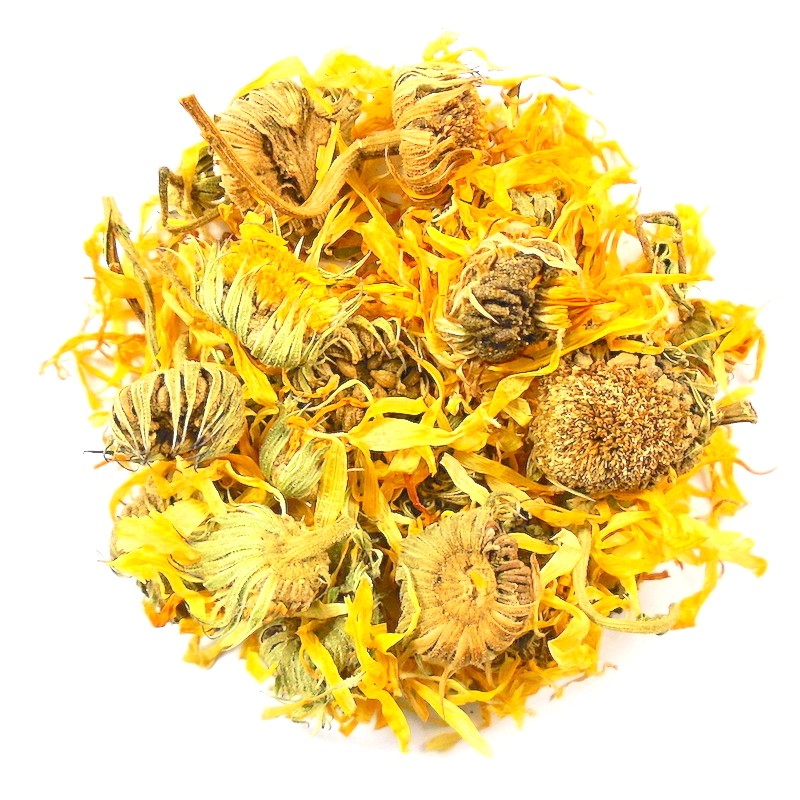Herbal Tea Brewing Guide

1 Teaspoon
Add 1 teaspoon per person and one for the pot.

95⁰c - 100⁰c
Boil using fresh water, at a temperature of 95⁰ - 100⁰c.

8 - 10 Mins
Steep for 8-10 minutes, depending on personal preference.
About Product
-
Product Description
Marigold tea has been around for centuries and its benefits have been widely studied for many years. The most common use of this herbal tea is to treat digestive problems, such as upset stomach, heartburn, and constipation. It can also help to improve blood circulation and reduce inflammation in the body.
More recently, researchers have found that drinking Marigold Flowers Tea can also help to boost your immune system and fight off colds and flu due to its high antioxidant content.
Other potential benefits include reducing symptoms of depression, improving sleep quality, treating sore throats and coughs, relieving menstrual cramps, and calming nerves and stress levels.
What is Marigold Tea
The culinary and medicinal history dates back to the Ancient Greeks, who utilized it as a remedy for sicknesses, colourant in food dishes, dye-maker for fabrics and cosmetics ingredients.
In addition to its original purpose of providing holistic healing benefits throughout centuries past, marigolds have become widely popular decorative additions featured across kitchen gardens all over the world.
Marigold is a highly resilient and low-maintenance annual plant with impressive staying power. Its vibrant orange sunflower blooms have long been utilized for medicinal purposes, easily flourishing from early summer until late autumn in northern climates or year-round where temperatures are more temperate.
The Latin name ‘Calendula’ translates to “the first day of the month” – an apt description as its cheerful petals stay in bloom nearly nonstop!
How to Make Marigold Tea
Making marigold tea is an easy process that requires only two ingredients: dried calendula petals and hot water. Fill your teacup with 1-2 teaspoons of the flower petals and pour 8 ounces of boiling water over them, allowing it to steep for 5-10 minutes. It’s now ready to enjoy!
You can also make a bigger batch by combining 2 tablespoons of the flowers with 16 ounces of boiling water in a saucepan. Simmer the mixture on low heat for 15 minutes and strain into a mug or cup before drinking.
Marigold tea can be enjoyed either hot or cold, making it perfect for any time of year! You may add honey or lemon to your tea if you wish, as both ingredients complement the flavour of the flowers.
Tasting Notes: The flavours of Marigold tea are earthy and slightly bitter. It has a unique floral aroma that is reminiscent of chamomile, with a hint of citrus.
Caffeine Content: Marigold tea is naturally caffeine-free, making it an excellent choice for those who are looking to avoid stimulants.
The Benefits of Drinking Marigold Tea
Marigold tea has been used in traditional medicine for hundreds of years and offers various health benefits. Its natural anti-inflammatory properties help to soothe digestive issues such as cramping and bloating. It can also be effective against skin disorders such as eczema and psoriasis.
In addition, marigold tea is filled with antioxidants which can protect the body from free radical damage, reducing the risk of chronic diseases like cancer and heart disease. Finally, its high polyphenol content helps to boost the immune system and fight off colds
Nutrients and Vitamins
Marigold tea is packed with beneficial antioxidants and other nutrients. It contains vitamin A, which helps promote healthy skin, eyesight and immunity; as well as vitamin C, which supports a strong immune system and can help to reduce inflammation.
Calendula petals are also rich in flavonoids, carotenoids and polyphenols, all of which can assist with reducing oxidative stress on the body.
Overall, marigold tea provides an array of essential vitamins and minerals that can help maintain optimal health. Regular consumption of this herbal beverage may even provide relief from headaches or muscle pain due to its calming properties.
Marigold Tea can Help with Inflammation
It is important to note that inflammation is a natural process, and it can be beneficial in some ways. In the right amounts, inflammation helps your body fight off invaders and heal itself. But when it gets out of control, chronic inflammation can lead to serious health issues over time.
Marigold tea could be the perfect solution to reduce this inflammation and help you get on the path to improved overall health. The tea is also loaded with vitamins and minerals, adding to its long list of health benefits.
Marigold has been shown to be an effective natural remedy for many ailments. Research indicates that its active chemicals have a hepatoprotective, cytotoxic and spasmogenic impact on the body – these effects have already been demonstrated in human trials.
Scientists have uncovered the remarkable ability of marigold tea to reduce inflammation and cellular damage by neutralizing free radicals. These compounds can help keep our bodies healthy!
Marigold Tea Can Help with Haemorrhoid
Haemorrhoids, or piles, are swollen and inflamed veins in the rectum or anus. Symptoms of haemorrhoids include itching, pain, and bleeding during bowel movements. Marigold Flower Tea can help with these symptoms by reducing inflammation and strengthening the walls of the blood vessels.
An animal study found that using marigold extract in treating wounds significantly improves healing. In comparison to those not given the treatment, over 88% of wound closures were achieved within 8 days with this remedy!
Furthermore, marigold tea contains bioactive components which may improve circulation and reduce swelling associated with haemorrhoid symptoms.
Marigold Tea Benefits Interstitial Cystitis
Interstitial cystitis, also known as bladder pain syndrome, is a chronic and often painful condition of the urinary tract. Its symptoms can include pain in the pelvic area, frequent urination, and an urgent need to urinate even after going recently.
Marigold tea may help relieve these symptoms by reducing inflammation in the body and helping to soothe the bladder muscles. Research also suggests that marigold tea can help decrease pain and improve bladder capacity.
Side Effects of Marigold Tea
Marigold tea is generally safe for consumption, but it may have some side effects in certain individuals. Drinking too much marigold tea can cause nausea and vomiting, as well as constipation. It is best to speak to your doctor before consuming large amounts of this herbal tea, especially if you are pregnant or breastfeeding.
In conclusion, marigold tea has a variety of proven health benefits and can be used to treat many different ailments. Its active compounds help reduce inflammation, improve circulation and soothe the bladder muscles – all of which are beneficial for maintaining good health.
However, it is important to be aware of any potential side effects before trying this remedy. With all that said, adding marigold tea into your diet is a great choice for those looking to improve their overall health!
-
Delivery Information
We offer reliable delivery services through Royal Mail to ensure that your orders reach you on time.
Here are the main points you should be aware of:
- Standard UK Delivery: £3.95 excluding delivery charge.
- Delivery Times: Orders are processed and dispatched within 2-5 working days but they may take longer during busy times. It is worth noting that all our orders are packed by hand in order to maintain the quality.
- Free Delivery: We are delighted to provide free shipping for UK orders over £35*. Moreover, customers from Europe can enjoy free shipping for any purchase above €75*. Furthermore, we offer free delivery in the USA for all purchases exceeding $125*. Please note terms and conditions may apply.
- Tracking: When your package is sent you will receive a tracking number via email so as to keep tabs of its progress.
International Shipping
We do ship worldwide meaning our products can be accessed by anyone around the world.
Here are some important details:
- Delivery Times: International deliveries vary based on destination, generally taking between 7-14 working days.
- Shipping Costs: International shipping costs are calculated at checkout based on your location and weight of your order. View full delivery charges for your location.
- Customs and Import Duties: Remember customs or import duties may exist depending on regulations in your country; these charges are borne by the customer.
Returns Policy
Your satisfaction is our top priority, however if for any reasons you’re not completely happy with your purchase, simply follow our returns procedure:
- Eligibility: Items returned within 30 days of receipt must remain unopened and in their original condition.
- Process: In order to return an item contact our customer service department using your unique order number after which detailed instructions will be given concerning returning them back to us securely.
- Refunds: Our aim is to refund you within 5-7 working days upon successful reception of returned goods. The refund amount will be credited to your original payment method.
For any other Enquiries or help please contact our Customer Support Team always at your service.
-
Product Reviews

 Loose Leaf Tea
Loose Leaf Tea Pyramids
Pyramids Tea Bags
Tea Bags Africa
Africa Assam
Assam Ceylon
Ceylon Chinese
Chinese Darjeeling
Darjeeling European
European Indian
Indian Japan
Japan Nepal
Nepal South East Asia
South East Asia Ayurveda Tea
Ayurveda Tea Black Tea
Black Tea Chai Tea
Chai Tea Flowering Tea
Flowering Tea Fruit Tisanes
Fruit Tisanes Green Tea
Green Tea Herbal Tea
Herbal Tea Matcha Tea
Matcha Tea Oolong Tea
Oolong Tea Organic Tea
Organic Tea Pu erh Tea
Pu erh Tea Rooibos Tea
Rooibos Tea White Tea
White Tea Asian Coffee
Asian Coffee Caribbean Coffee
Caribbean Coffee Central American Coffee
Central American Coffee South American Coffee
South American Coffee Coffee Blends
Coffee Blends Decaffeinated Coffee
Decaffeinated Coffee Espresso Coffee
Espresso Coffee Ethically Sourced Coffee
Ethically Sourced Coffee Flavoured Coffee
Flavoured Coffee Organic Coffee
Organic Coffee Single Origin Coffee
Single Origin Coffee Chocolate 1
Chocolate 1 Chocolate 2
Chocolate 2 Chocolate 3
Chocolate 3 Chocolate 4
Chocolate 4 Chocolate 5
Chocolate 5 Chocolate 6
Chocolate 6 Chocolate 7
Chocolate 7 Chocolate 8
Chocolate 8 Chocolate 9
Chocolate 9 Loose Tea Filters
Loose Tea Filters Tea Accessories
Tea Accessories Tea Bricks
Tea Bricks Tea Caddies
Tea Caddies Tea Caddy Spoons
Tea Caddy Spoons Tea Gift Ideas
Tea Gift Ideas Tea Infusers
Tea Infusers Tea Strainers
Tea Strainers


